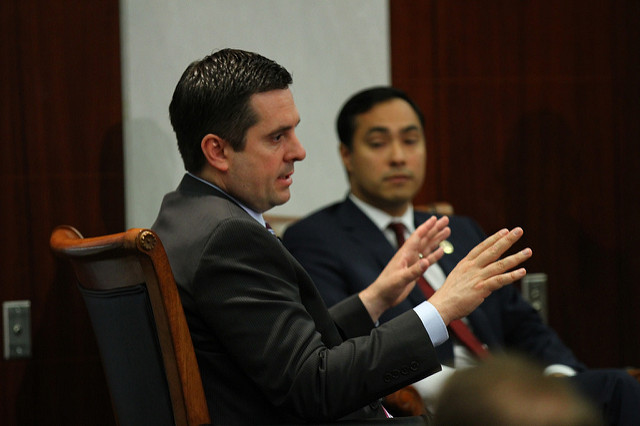The Irony of the Nunes Memo
The central irony of the memo prepared by House intelligence chairman Devin Nunes, we now know, is that it tried to deceive the American people in precisely the same way that it falsely accused the FBI of deceiving the FISA Court. The key question going forward is whether the memo’s authors and sponsors will face any consequences for their dishonesty.

Published by The Lawfare Institute
in Cooperation With

The central irony of the memo prepared by House intelligence chairman Devin Nunes, we now know, is that it tried to deceive the American people in precisely the same way that it falsely accused the FBI of deceiving the FISA Court. The key question going forward is whether the memo’s authors and sponsors will face any consequences for their dishonesty. If not, we can expect to see more of the same, with potentially dire results.
By now, several days after release of the minority response memo and with so much conflicting noise in the system, many people may have thrown up their hands and moved on to other topics. For that reason, I have kept this post short and focused on essentials. It’s important, in the era of President Trump, to afford hard issues the same, thoughtful, nuanced treatment that we would expect under different circumstances. But it’s also important, when the situation warrants it, to call a spade a shovel.
The Nunes memo was dishonest. And if it is allowed to stand, we risk significant collateral damage to essential elements of our democracy.
1. The Nunes memo’s fundamental claim was that the FBI misled the court about Christopher Steele, the former British agent who was a source of information in the FISA applications on Carter Page. It accused the Bureau of failing to “disclose or reference the role of the [Democratic National Committee], Clinton campaign, or any party/campaign in funding” Steele’s research. The government, it argued, portrayed Steele as unbiased, when in fact “the political origins of the Steele dossier were then known to senior DOJ and FBI officials.” This was strong stuff, certainly troubling if true.
Today we know that it was not true. Almost four weeks ago, based on my experience with the FISA program and those who administer it, I expressed confidence that the government “provided the court with enough information to meaningfully assess Steele’s credibility.” It took a while, but with the benefit of the minority memo—even in redacted form—this has now been confirmed. In other words, Nunes’s claim that the FBI misled the court was itself misleading. There are other ways in which the memo was misleading—discussed in the back and forth between Nunes and his critics on the House Intelligence Committee, and in Charlie Savage’s characteristically excellent summary in the New York Times—but the FBI’s alleged effort to deceive the court about Steele has always been the heart of the matter, and I am trying in this post to stick to the core.
The FISA applications did not mention the “DNC” or the “Clinton campaign” by name, but they did recount how Steele was approached and then hired by “an identified U.S. Person,” Glen Simpson, who explained to Steele that he in turn had been hired by a “U.S.-based law firm,” Perkins Coie, “to conduct research regarding Candidate #1,” Donald Trump, and Trump’s “ties to Russia.” (The use of generic identifiers in the FISA applications is consistent with standard practice, as Nunes is well aware; the minority memo provides the names for each identifier.) The FISA applications also advised the court: “The FBI speculates that [Simpson] was likely looking for information that could be used to discredit [Trump’s] campaign.”
That amply satisfies the requirements. As someone who has read and approved many FISA applications, and dealt extensively with the FISA Court, I will anticipate and reject a claim that the disclosure was somehow insufficient because it appeared in a footnote; in my experience, the court reads the footnotes. The government’s disclosures enabled the court to take Steele’s information with a grain of salt. They allowed the court to decide, based on all of the information presented, whether there was “probable cause” that Carter Page “knowingly” engaged in “clandestine intelligence activities” for Russia that involve, may involve, or are about to involve “a violation of the criminal statutes of the United States.” It’s disturbing that Page met that legal standard and that there was probable cause to conclude he was a Russian agent.
2. It’s even more disturbing that a purported oversight memo would withhold key facts from the American people in accusing the government of withholding key facts from the court. Had the FBI done in its FISA applications what Nunes did in his memo, heads would have rolled on Pennsylvania Avenue. The court itself, as well as both intelligence committees, several inspectors general, and the Justice Department’s Office of Professional Responsibility all could have brought their shillelaghs to bear. The court, in particular, has done so once before, when it was dissatisfied with the candor of an FBI agent.
Congressional oversight is a critically important function, but who watches the watchers? There are only two meaningful overseers for Nunes himself: House Speaker Paul Ryan and the voters of California’s 22nd district. House Minority Leader Nancy Pelosi and Senate Minority Leader Chuck Schumer have urged Ryan to remove Nunes from his role on the House Intelligence Committee. Don’t hold your breath. As for the voters, time will tell, but Nunes won his last election by a wide margin.
Harvard Law Professor Laurence Tribe and others believe that Nunes might be prosecuted for obstruction of justice, despite the Constitution’s Speech or Debate Clause. If so, a third overseer, Special Counsel Robert Mueller, might also get involved. For now, that seems unlikely. But affecting Mueller or perceptions about Mueller, directly or via his supervisor, Deputy Attorney General Rod Rosenstein, is pretty clearly at least part of what is really going on here. As another Harvard Law Professor, Philip Heymann, has explained, the appointment of a special counsel “is an invitation to dramatic and public political battle” that takes many forms.
3. The question now is whether intelligence oversight, and the broader paradigm of intelligence under law, will become collateral damage in that battle. We established that paradigm only in the mid-1970s, and only after revelation of horrific abuses by the intelligence community, and it is by no means inevitable or invulnerable. American institutions are resilient, but they should not be tested this way. If there is no consequence for the Nunes memo, then I fear that we will see its like again and again. Our democracy is under strain, but there is still room for the voters to express their will. That is the best way to reduce this sort of disgraceful and dangerous nonsense.



.jpg?sfvrsn=912f39e2_5)
